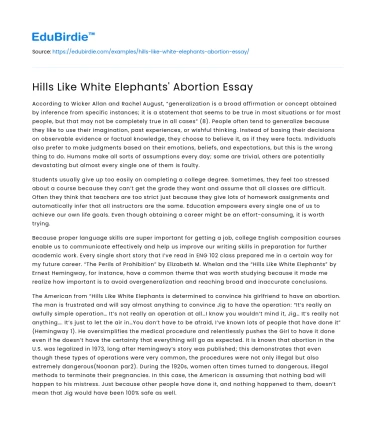According to Wicker Allan and Rachel August, “generalization is a broad affirmation or concept obtained by inference from specific instances; it is a statement that seems to be true in most situations or for most people, but that may not be completely true in all cases” (8). People often tend to generalize because they like to use their imagination, past experiences, or wishful thinking. Instead of basing their decisions on observable evidence or factual knowledge, they choose to believe it, as if they were facts. Individuals also prefer to make judgments based on their emotions, beliefs, and expectations, but this is the wrong thing to do. Humans make all sorts of assumptions every day; some are trivial, others are potentially devastating but almost every single one of them is faulty.
Students usually give up too easily on completing a college degree. Sometimes, they feel too stressed about a course because they can’t get the grade they want and assume that all classes are difficult. Often they think that teachers are too strict just because they give lots of homework assignments and automatically infer that all instructors are the same. Education empowers every single one of us to achieve our own life goals. Even though obtaining a career might be an effort-consuming, it is worth trying.
Save your time!
We can take care of your essay
- Proper editing and formatting
- Free revision, title page, and bibliography
- Flexible prices and money-back guarantee
Because proper language skills are super important for getting a job, college English composition courses enable us to communicate effectively and help us improve our writing skills in preparation for further academic work. Every single short story that I’ve read in ENG 102 class prepared me in a certain way for my future career. “The Perils of Prohibition” by Elizabeth M. Whelan and the “Hills Like White Elephants” by Ernest Hemingway, for instance, have a common theme that was worth studying because it made me realize how important is to avoid overgeneralization and reaching broad and inaccurate conclusions.
The American from “Hills Like White Elephants is determined to convince his girlfriend to have an abortion. The man is frustrated and will say almost anything to convince Jig to have the operation: “It’s really an awfully simple operation… It’s not really an operation at all…I know you wouldn’t mind it, Jig… It’s really not anything…. It’s just to let the air in…You don’t have to be afraid, I’ve known lots of people that have done it” (Hemingway 1). He oversimplifies the medical procedure and relentlessly pushes the Girl to have it done even if he doesn’t have the certainty that everything will go as expected. It is known that abortion in the U.S. was legalized in 1973, long after Hemingway’s story was published; this demonstrates that even though these types of operations were very common, the procedures were not only illegal but also extremely dangerous(Noonan par2). During the 1920s, women often times turned to dangerous, illegal methods to terminate their pregnancies. In this case, the American is assuming that nothing bad will happen to his mistress. Just because other people have done it, and nothing happened to them, doesn’t mean that Jig would have been 100% safe as well.
In the “Perils of Prohibition”, Elizabeth M. Whelan tends to generalize and make bad comparisons as well. She commits a huge mistake because she assumes that all teens act and think the same. In the second paragraph, Elizabeth Whelan says “From my own study of the effects of alcohol restrictions and my observations of Christine and her friend’s predicament about drinking, I believe that today’s laws are unrealistic” (2). It is unfair to count on such a limited number of people to conduct an observation and to predict the cause of a problem. She has to focus on a wider number of individuals and look deeper into the issue in order for her to reach a plausible conclusion. This assumption hurts her argument and weakens her justification.
One important lesson that I learned in Mrs. Escobio’s English class which I will definitely use in my future career is that what works for others might not work for me and vice versa. Since I’m choosing Nursing as my future career, most likely I will not apply the same kind of treatment to all of my patients because every individual has his own medical, social, and psychological histories. Besides the fact that English classes, during my college years, taught me to be more independent and think critically it also helped me improve my writing, vocabulary, and grammar. Furthermore, in this class, I had the opportunity to learn to express myself concisely, accurately, and convincingly.
Works Cited
- Chopin, Kate. “The Story of an Hour.” Virginia Common Wealth. English Web Texts. N.d. Web 22 Oct. 2019.
- Noonan Jr., John T. “Abortion in the American Context.” Human Life Review, vol. 43, no. 3, Summer 2017, pp. 11–19. EBSCOhost, search.ebscohost.com/login.aspx?direct=true&db=aph&AN=125447873&site=ehost-live.
- Whelan, Elizabeth. “The Perils of Prohibition”. Critical thinking, reading, and writing. Eds. Sylvan Barnet and Hugo Bedau. Bedford: Boston, 1999. 85-86.
- Wicker, Allan W., and Rachel A. August. “HOW FAR SHOULD WE GENERALIZE? The Case of a Workload Model.” Psychological Science (0956-7976), vol. 6, no. 1, Jan. 1995, pp. 39–44. EBSCOhost, doi:10.1111/j.1467-9280.1995.tb00302.x.






 Stuck on your essay?
Stuck on your essay?

